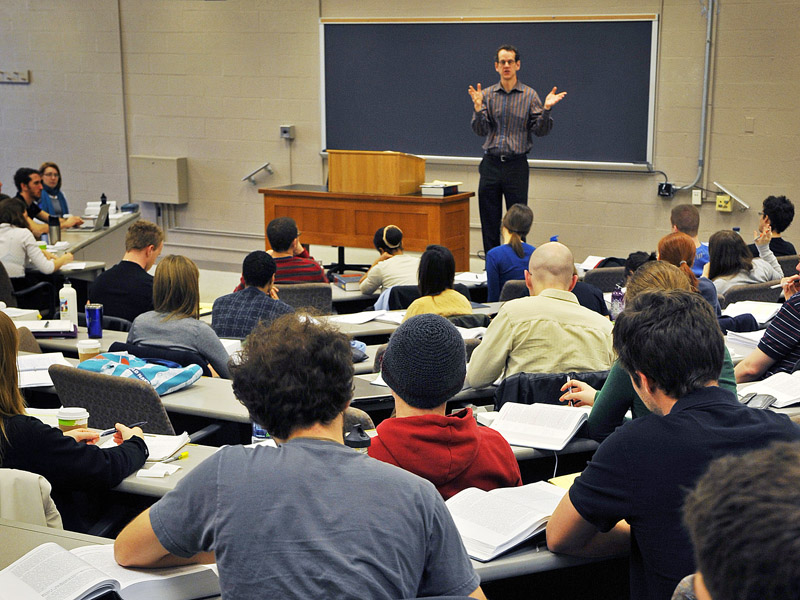WASHINGTON — On a windy morning in downtown Washington, a hundred Georgetown Law students gathered in a hall for David Cole’s lecture on democracy and coercion. The desks were cluttered with books, Thermoses and half-eaten muffins.
Another item was noticeable in its absence: laptop computers. They were packed away under chairs, tucked into backpacks, powered down and forgotten.
Cole has banned laptops from his classes, compelling students to take notes the way their parents did: on paper.
A generation ago, academia embraced the laptop as the most welcome classroom innovation since the ballpoint pen. But during the past decade, it has evolved into a powerful distraction. Wireless Internet connections tempt students away from note-typing to e-mail, blogs, YouTube videos, sports scores, even online gaming – all the diversions of a home computer beamed into the classroom to compete with the professor for the student’s attention.
“This is like putting on every student’s desk, when you walk into class, five different magazines, several television shows, some shopping opportunities and a phone, and saying, ‘Look, if your mind wanders, feel free to pick any of these up and go with it,’ ” Cole said.
Professors have banned laptops from their classrooms at George Washington University, American University, the College of William and Mary and the University of Virginia, among many others. Last month, a physics professor at the University of Oklahoma poured liquid nitrogen onto a laptop and then shattered it on the floor, a warning to the digitally distracted. A student – of course – managed to capture the staged theatrics on video and drew a million hits on YouTube.
Cole was among the first professors in the Washington region to ban laptops, in the 2006-07 academic year. He found them an “attractive nuisance.” It was a bold decree: Georgetown had only recently begun requiring that first-year law students own laptops, after painstakingly upgrading the campus for wireless Internet access.
The laptop computer, introduced in 1981, has become nearly obligatory on campus; some colleges require them. They are as essential to today’s student as a working stereo system was to their parents.
Madeline Twomey, 20, a junior at George Washington, has used a computer since age 6 and had her first laptop at 15. She senses a widening generation gap. “Most professors, even at their youngest, they’re in their 30s,” she said. “They don’t understand how much it’s become a part of our lives.”
Professors say they do understand – all too well.
Diane Sieber, an associate professor of humanities at the University of Colorado at Boulder, has debated her students on the collegiate conceit of multitasking, the notion that today’s youths can fully attend to a lecture while intermittently toggling over to e-mail, ESPN and Facebook.
“It’s really serialized interruption,” Sieber said. “You start something, you stop it, you do something else, you stop it, which is something you’re doing if you’re switching back and forth between World of Warcraft and my class.”
One recent semester, Siebert tracked the grades of 17 student laptop addicts. At the end of the term, their average grade was 71 percent, “almost the same as the average for the students who didn’t come at all.”
Sieber believes that those students, in turn, divert the attention of the students behind them, a parabolic effect she calls the “cone of distraction.”
José Bowen, dean of the Meadows School of the Arts at Southern Methodist University, is removing computers from lecture halls and urging his colleagues to “teach naked” – without machines. Bowen says class time should be used for engaging discussion, something that reliance on technology discourages.
Some early attempts to ban laptops met resistance. In 2006, a group of law students at the University of Memphis complained to the American Bar Association, in vain. These days, the restriction is so common that most students take it in stride.
“I think that a professor’s well within reason to ban laptops,” said Cristina Cardenal, a 20-year-old Georgetown junior. “Professors aren’t stupid. They know what’s going on.” She also happens to believe that the rule benefits students, who should know better than to “pay as much money as we do to sit in a class and read a blog.”
Perhaps no college has experienced the good and bad of laptops like Bentley University in Waltham, Mass. In 1985, Bentley was the first college in the nation to require students to own portable computers. By the late 1990s, professors complained of distracted students.
In 2000, the college installed a custom-designed system that allowed professors to switch off Internet and e-mail access in their classrooms. Professors have flipped the switch “thousands of times,” said Phillip Knutel, an executive director who oversees technology at Bentley.
Universities have stopped short of disabling Internet access entirely, which might create a raft of new complaints from professors who routinely ask students to go online in class.
Send questions/comments to the editors.



Success. Please wait for the page to reload. If the page does not reload within 5 seconds, please refresh the page.
Enter your email and password to access comments.
Hi, to comment on stories you must . This profile is in addition to your subscription and website login.
Already have a commenting profile? .
Invalid username/password.
Please check your email to confirm and complete your registration.
Only subscribers are eligible to post comments. Please subscribe or login first for digital access. Here’s why.
Use the form below to reset your password. When you've submitted your account email, we will send an email with a reset code.